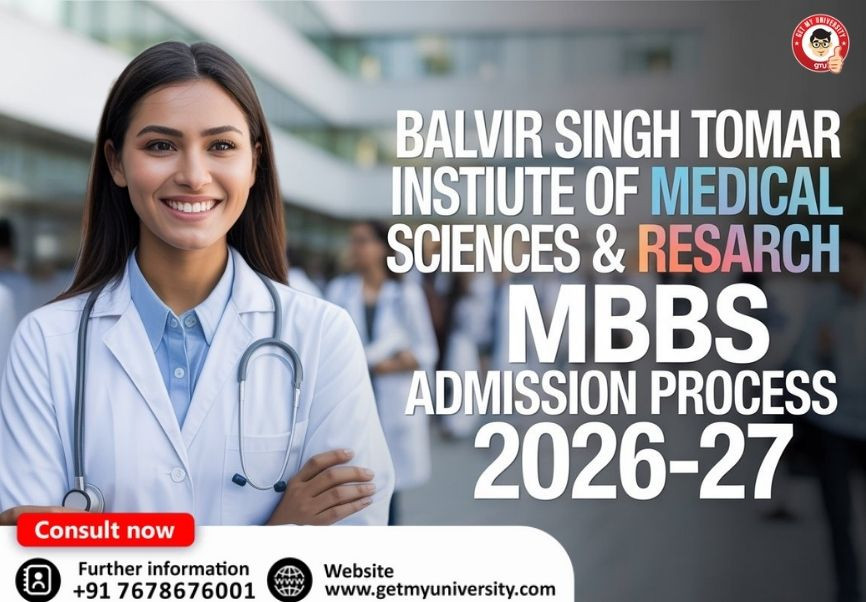Introduction
Choosing the right medical college is one of the most significant decisions in a student's life, as it forms the foundation for their entire medical education. While government medical colleges are often the preferred choice due to their affordable fees, the high cutoff scores leave many students unable to secure a seat. This can lead to feelings of frustration and thoughts of taking a gap year to try again.
However, students can consider private medical colleges as an alternative to pursue their dream of becoming a doctor. Many reputable private institutions offer excellent medical education, comprehensive clinical exposure, and the necessary resources to build a successful career in medicine.
Continue reading this blog to explore whether pursuing an MBBS degree from a private medical college is truly worth it.
Get in Touch with Team Get My University
Call us on +917678 676 001
OR
Write us at info@getmyuniversity.com
Key Factors to Consider while Selecting a Medical College
When selecting a medical college, evaluating its faculty, clinical facilities, laboratories, infrastructure, and co-curricular activities is essential. A well-rounded institution with experienced faculty and state-of-the-art clinical exposure can significantly impact your medical education and future career.
Private medical colleges often invest heavily in modern infrastructure and cutting-edge labs. However, the quality of clinical exposure can vary. Government colleges, on the other hand, are generally known for providing extensive clinical training due to a higher patient inflow. It is crucial to weigh these aspects based on your career goals and learning preferences.
Advantages of Studying at Private Medical College
Here are the main benefits of private medical college that every medical student can utilize:
- Modern Infrastructure: Private medical colleges offer state-of-the-art facilities, advanced laboratories, and well-equipped classrooms to enhance learning. These resources provide students with hands-on exposure to the latest medical technologies.
- Skilled Faculties: Experienced and knowledgeable faculty members ensure high-quality education. They focus on nurturing students’ academic and professional growth.
- Vibrant Campus Life: A dynamic and engaging campus environment supports extracurricular activities, fostering all-round development. Events and student organizations provide opportunities for networking and personal growth.
- Hospitals Equipped for Critical Cases: Affiliated hospitals have advanced equipment and facilities to manage complex and critical medical cases. This helps students gain valuable clinical exposure.
- Better Living Conditions: Private colleges provide comfortable hostels and modern amenities, ensuring a good standard of living for students.
- Emphasis on Research: Many private institutions encourage innovative research, offering students opportunities to work on cutting-edge medical projects.
Challenges of Private Medical Colleges
Here are some challenges students may encounter in private medical colleges. However, these challenges are often manageable, as private colleges offer opportunities for students with lower scores to secure admission in reputed institutions and receive education and clinical exposure comparable to government medical colleges. Therefore, these should not be seen as disadvantages but rather as factors to consider. Parents should be well-informed about these points before enrolling their child.
• High Fees: One of the biggest challenges is the high cost of education. Private medical colleges generally have much higher fees than government institutions, which can make them less affordable for many families. However, scholarships, loans, or payment plans can help ease this burden for eligible students.
• Varied Quality: The quality of education, clinical training, and facilities can vary significantly from one private college to another. Each institution may excel in specific areas, so it is essential to research a college’s strengths, reputation, and specializations before making a decision.
• Social Stigma: Private medical colleges sometimes face societal bias, as they are often perceived as less prestigious than government colleges. However, this perception is changing as many private institutions improve their standards and produce successful graduates who excel in their careers.
Don’t worry, as Team Get My University (GMU) is here to support students by providing comprehensive information about private medical colleges. This includes details about tuition fees, additional charges, and other financial aspects, ensuring you have a clear understanding of the costs involved. Moreover, Team GMU helps identify colleges that excel in academics, clinical training, and overall educational quality, guiding you toward institutions that align with your aspirations.
What sets Team GMU apart is the expertise in offering personalized, profile-based counseling. They take the time to understand each student’s academic background, preferences, and career goals, enabling them to recommend the best-fit medical colleges. With their dedicated guidance and in-depth knowledge, Team GMU simplifies the decision-making process, empowering students to confidently choose the right college and take a step closer to fulfilling their dream of becoming a doctor.
Does the College Alone Define Your Success?
According to Team Get My University, the clear answer is no. While the college you choose can provide you with the resources and opportunities to grow, your success ultimately depends on how you utilize these resources. A dedicated student from a private college can outperform a complacent student from a prestigious government institution.
Conclusion
Your success in the medical field depends more on your dedication, hard work, and passion rather than whether you study MBBS at a government or private medical college. For instance, a student who graduated from Maulana Azad Medical College (MAMC), one of India’s top government institutions, struggled to excel and eventually had to pursue postgraduate studies at a deemed university.
This example highlights that attending a renowned college alone does not guarantee success. It is your consistent effort, willingness to learn, and ability to apply your knowledge in practice that truly shape your career.
So, whether you choose a private or government medical college, your determination and commitment will play the most significant role in your journey. Regarding the question of this blog, the answer is clear:
Yes, pursuing an MBBS from a private medical college is absolutely worth it.




.jpg-79334.jpg)










.jpg-12992.jpg)
